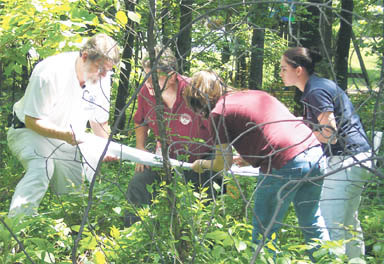
When the scientist was young and reckless, he would venture into the steaming forests of South America, peel off his shirt and sit on a fallen tree for hours, letting bugs devour him in "human bait experiments." Even in the blackest nights, he could identify, unseen, which species of fly or mosquito was biting him. The sand flies that inspired his doctoral thesis twice gave him leishmaniasis, a disease caused by a parasite that gives rise to skin ulcers. The mosquitoes gave him malaria. He shrugs off both, equally matter-of-fact about the polio he contracted during his childhood in Panama. It was hepatitis, he says, that nearly killed him.
Brazil RPCV Jorge Arias is a medical entomologist
Bitten by the Bug Bug: An Entomologist's Life
The Washington Post
By Tamara Jones
August 02, 2006
Caption: Jorge Arias, left, entomologist, county health department, looks for ticks with David Gaines, center, entomologist, state department of health and Jennifer Johnson, biologist, county health department. Photo courtesy Fairfax County Health Department
I thought, 'Oh, my Lord, this is heaven.' I get to play with mosquitoes!
Fever has a way, in the jungle, of grabbing hold of a man, grabbing and not letting go even after the aches and the trembling and the deep sleep have passed. Jorge Arias has survived fevers like that in his 63 years, but they changed him.
It's the only way this medical entomologist can explain the sense of wonder that has driven him, over the course of a storied career, from the rain forests of the Amazon to the rain gutters of Annandale, seeing mystery where most see menace, consumed both body and mind by mosquitoes.
When the scientist was young and reckless, he would venture into the steaming forests of South America, peel off his shirt and sit on a fallen tree for hours, letting bugs devour him in "human bait experiments." Even in the blackest nights, he could identify, unseen, which species of fly or mosquito was biting him. The sand flies that inspired his doctoral thesis twice gave him leishmaniasis, a disease caused by a parasite that gives rise to skin ulcers. The mosquitoes gave him malaria. He shrugs off both, equally matter-of-fact about the polio he contracted during his childhood in Panama. It was hepatitis, he says, that nearly killed him.
Now the jungles have been replaced by the suburban woods of Northern Virginia, the exhausting hikes forfeited for a white pickup truck with a yellow flashing light on top, courtesy of the Fairfax County Health Department. The words emblazoned on the truck's tailgate are the same ones embroidered on his long-sleeved white shirt: Mosquito Control.
Arias was facing mandatory retirement from the Pan American Health Organization, manning its dengue desk in Washington, when West Nile virus turned up here four years ago. Fairfax launched its Disease Carrying Insects Program, and put Arias in charge.
"I thought, 'Oh, my Lord, this is heaven.' I get to play with mosquitoes!" There are more than 40 species in the region, he points out happily. "Oh yeah, I love them."
Playing with them is an elaborate game, a strange seduction involving German traps and bottles of something called SkinLure, synthetic human sweat ordered from a California lab. Arias pours it onto sponges before heading to the woods behind the health department's parking lot in Fairfax City.
The woods boast a streambed, prime hunting grounds for the Asian tiger mosquito currently capturing Arias's attention. He and his team -- a handful of young biologists and students -- have four traps hanging from trees. Powered by batteries and hooked up to CO2tanks, sweat-sponges hidden inside, they lure mosquitoes by mimicking the scent and breath of humans.
Sucked into the trap by vacuums, the mosquitoes are captured in net stockings (sewn by Arias's wife, Kathy, when the county supply runs short) and then separated according to species. The species known to carry West Nile are dispatched by courier to Richmond for testing by the state. Since mosquito season officially began May 1, Arias has sent 63,401 mosquitoes to the capital. More are waiting in his laboratory freezer. ("They keep fresher that way, and the ants don't eat them.") Only seven positives have come back.
He has been published dozens of times and regularly reviews or edits scholarly works on insect-borne tropical disease, but the questions he can't answer still delight him: Is West Nile more likely to occur when the temperatures are higher, or after a heavy rainfall? When mosquitoes are dense, or when there are few?
In the Huntington neighborhood of Alexandria, ravaged by recent floods, Arias sets out on a blistering afternoon to collect the insects from the traps he has made to lure pregnant females in particular, setting a gray box that serves as a mosquito maternity ward over a tray of fetid swamp water he brews himself and carries around in plastic jugs. (The water ferments in eight trash drums in the health department parking lot, the stench fortified by straw, yeast and the fresh-mown grass Arias bags from his own Baileys Crossroads lawn. The concoction, he advises, must sit in the hot sun and be stirred once a day -- a task ideally performed by young and eager assistants who should be grateful Arias no longer believes in human bait experiments.)
Perspiration drenches the white terry sweatband around Arias's forehead, and he wrinkles his nose in disgust at the stink that lingers on his hands from wayward splashes of his homemade swamp water. Fourteen types of insecticide -- sprays, roll-ons, wristbands, coils -- line the shelf over his county-issued desk back at the health department, but he doesn't bother with any of them before conducting what he calls "mosquito surveillance." They seem to have lost their taste for Jorge Arias, had their fill of him long ago. He emerges from the buzzing woods again and again, welt-free.
He wasn't a boy fascinated by bugs, not the one with the junior microscope or jars of captive insects in his bedroom. In fact he grew up -- son of a doctor, survivor of polio -- believing that medicine was his calling. Just a few months of pre-med convinced him otherwise, but when he happened to take an entomology class, Arias remembers the hallelujah moment, the recognition of a life's singular passion.
He completed his doctorate at the University of California at Riverside, where he met and married Kathy, and the young newlyweds joined the Peace Corps. Posted to Brazil, Arias built a lab and established a graduate entomology program. The Peace Corps stint led to scientific appointments in Panama, Venezuela, then back to Brazil again.
Along the way, he won the admiration of so many proteges and colleagues that 16 bugs were named for him, and though he dips his head modestly when describing his personal book louse, he can also print the entire 16-name list of Coniopteryx jorgeis and Peritropoides ariasis with a single computer command.
Arias is uncharacteristically quiet if you ask what insects have taught him, and the scientist hesitates to offer the private conclusions he has drawn, the ones whose premises cannot be analyzed or graphed or proven.
He begins by mentioning, too casually, the near-death experiences of 26 years in the sweltering tropics. He recalls the member of his field team killed by a lightning strike, and how the others tried CPR in vain, then carried his body a kilometer back out of the jungle. He recalls the Brazilian gold mine where a man was shaking with malaria and Arias knew, just knew, the minute his own fever began to flame, that he had contracted it, too.
And then there was the hepatitis. Arias was in the field again, Kathy back home, nine months pregnant with their second child. Arias felt the fever grab him. His vomit was black. He suspected hepatitis and confirmed it with the medical manual he carried. His symptoms, the reference book explained, gave him a 30 percent chance of survival.
"I went to sleep that night, and I knew," he remembers."I said, 'God, I know this is it, please take care of Kathy and the kids.' " He was 33 years old.
The next morning, "it was like one of those cinematic, movie moments," he says. "I opened my eyes. I looked at my hand, wiggled my fingers. I was alive!"
And so he believes, not officially, not as a government employee, not scientifically, but deeply, that life is part of a "fantastic plan," not something coincidental, not random. He sees magnificence in the snowstorm recaptured by his computer screensaver, or in the weird fly someone brought him the other day, a tiny insect "with great big colorful spines all over its body, and I thought: Wow."
More than 30 years have passed, and he and Kathy have raised two sons and two daughters. Now everyone is back in the States, and there are three grandsons to dote on and teach about the mysteries of small things. The mosquito hunter is content in these gentler woods, where the heat and buzz of life, in high summer, draw him.
Copyright © 2006 The Washington Post, All Rights Reserved.
























